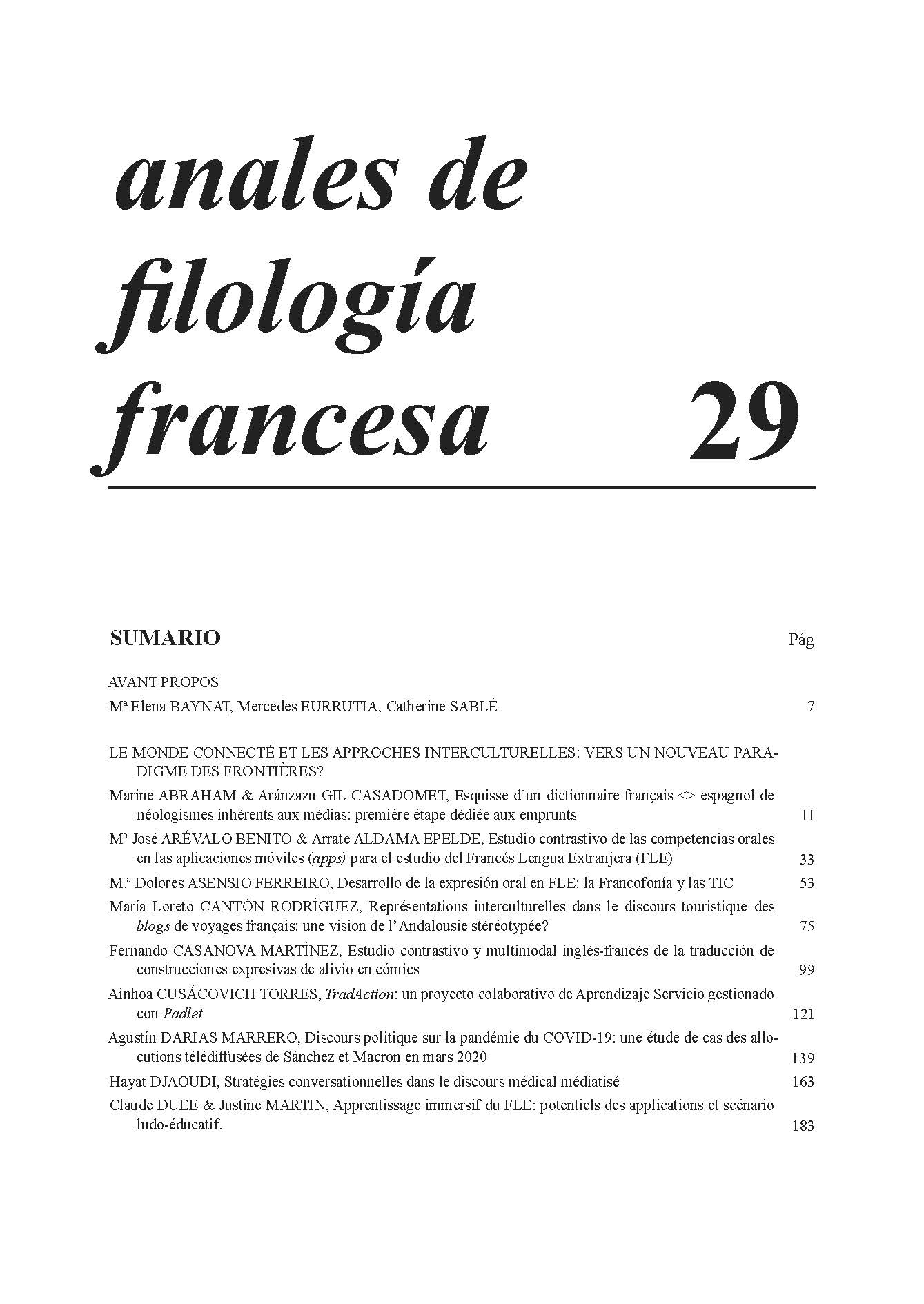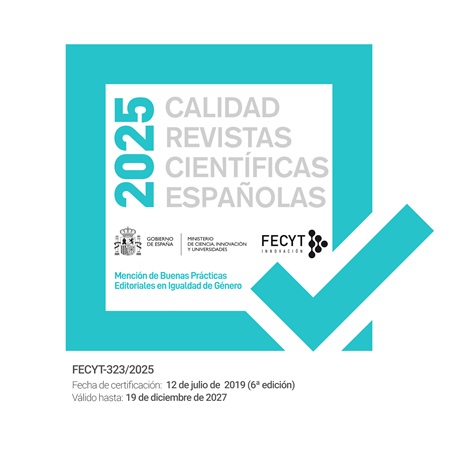Facebook as a platform for developing professional skills of language teachers and students: Case study
Abstract
Nowadays, the diffusion of technologies, and in particular social networking, requires language teachers to learn new data in their teaching practices. Yet, by observing on the net, we remark the existence of many communities, especially on Facebook, which aim to inform teachers and language students about new knowledge. What are the reasons why a language teacher or student becomes a member of these communities? Do social networking sites help language teachers improving their professional skills? Developing professional skills is one of the most significant actions required for a language student to secure a teaching career.
Downloads
-
Abstract369
-
PDF (Français )582
References
Références bibliographiques
BLATTNER, G. & M. Fiori. 2009. “Facebook in the Language Classroom: Promises and Possibilities” in Instructional Technology and Distance Learning (ITDL), vol. 6, n° 1, 17-28: <http://www.itdl.org/journal/jan_09/article02.htm>[21/01/2021].
BLATTNER, G. & LOMICKA, L. 2012. “Facebook-ing and the Social Generation: A New Era of Language Learning. Médias sociaux et apprentissage des langues: (r)évolution?" in Apprentissage des langues et systèmes d’information et de communication (Alsic), vol. 15, n°1:<https://alsic.revues.org/2413>[15/01/2021].
BROWN, J. S., COLLINS, A. & P. DUGUID. 1989. “Situated cognition and the culture of learning” in Educational Researcher, vol. 18, n° 1, 32-42: <http://edr.sagepub.com/content/18/1/32>[04/03/2021].
BUTLER, D., LAUSCHER, H., JARVIS-SELINGER, S. & B. BECKINGHAM. 2004. “Collaboration and self-regulation in teachers’ professional development” in Teaching and Teacher Education, vol. 20, 435-455.
CHARLIER, B. 2006. “Collaborer dans l'enseignement supérieur: apprentissages individuels et institutionnels” in AIPU, Université de Fribourg: <https://www.researchgate.net/profile/Bernadette_Charlier/publication/228347585_Collaborer_dans_l'enseignement_suprieur_apprentissages_individuels_et_institutionnels/links/09e4150f95c1ac202a000000.pdf>[11/04/2021].
CHARLIER, B. & A. DAELE. 2006. “Comprendre les communautés virtuelles d’enseignants” in Pratiques et recherches. Paris, L’Harmattan.
CHARLIER, B. & D. PERAYA (éds.). 2003. Technologie et innovation en pédagogie: dispositifs innovants de formation. Brussels, De Boeck Université.
COBB, P. & E. YACKEL. 1996. “Constructivist, emergent, and sociocultural perspectives in the context of development research” in Educational Psychologist, vol. 31, 175-190: <http://www.tandfonline.com/doi/abs/10.1080/00461520.1996.9653265> [3/05/2021].
COLLINSON, V., KOZINA, E., KATE LIN, Y., LING, L., MATHESON, I., NEWCOMBE, L., et al. 2009. “Professional development for teachers: a world of change” in European Journal of Teacher Education, vol. 32(1), 3-19.
DAELE, A. 2004. Développement professionnel des enseignants dans un contexte de participation à une communauté virtuelle: une étude exploratoire. Mémoire de DEA en Sciences de l’Éducation. Université catholique de Louvain.
DAELE, A. 2010. “Conditions et vécu du conflit sociocognitif au sein d’une communauté virtuelle d’enseignants: proposition d’un cadre d’analyse et étude de cas” in Education & Formation, vol. e-293, 65–80: <http://grms.uqam.ca/upload/files/Travail_en_communauts_collaboration_et_partenariats_pour_le.pdf#page=65>[18/04/2021].
DAELE, A. 2013. Discuter et débattre pour se développer professionnellement. Analyse compréhensive de l’émergence et de la résolution de conflits sociocognitifs au sein d’une communauté d’enseignants du primaire. Thèse de doctorat en Sciences de l’Education). Université de Genève, Genève:<http://archive-ouverte.unige.ch/unige:27065>[15/05/2021].
DAELE, A. 2014. “Débattre en ligne pour se développer professionnellement. Adjectif, Analyses” in Recherches sur les TICE. Suisse: Université de Lausanne: <http://www.adjectif.net/spip/spip.php?article273>[22/05/2021].
DAY, C. 1999. Developing Teachers: The Challenges of Lifelong Learning. London, The Falmer Press.
DEAUDELIN, C., DUSSAULT, M. & M. BRODEUR. 2003. “Human-Computer Interaction: A Review of the Research on its Affective and Social Aspects” in CJLT RCAT:<https://ejournals.library.ualberta.ca/index.php/cjlt/article/view/26556/19738>[23/05/2021].
DEPOVER, C. & L. MARCHAND. 2002. E-learning et formation des adultes en contexte professionnel. Belgique, De Boeck: <https://books.google.fr/books?hl=el&lr=&id=TCHNB-8yOQwC&oi=fnd&pg=PA1&dq=Depover+%26+Marchand+2002&ots=2o43rMexvG&sig=lpD3DxOmGpAT1C9e964Zit7d0_g#v=onepage&q=Depover%20%26%20Marchand%202002&f=false>[22/05/2021].
DILLENBOURG, P., POIRIER, C. & L. CARLES. 2003. “Communautés virtuelles d'apprentissage: e-jargon ou nouveau paradigme?” in Taurisson, A. & Sentini, A. (dir.). Pédagogies.net. Montréal, Presses Universitaires du Québec, 1-26.
Donnay, J., & E. Charlier. 2006. Apprendre par l’analyse des pratiques. Initiation au compagnonnage réflexif. Namur, PUN-Editions du CRP.
GODWIN-JONES, R. 2008. “Emerging Technologies: web-writing 2.0: Enabling, documenting, and assessing writing online” in Language Learning & Technology, vol. 12, n° 2, 7-13: <http://llt.msu.edu/vol12num2/emerging.pdf>[22/05/2021].
GREENE, J. A. & R. AZEVEDO. 2007. “A Theoretical Review of Winne and Hadwin's Model of Self-Regulated Learning: New Perspectives and Directions in Review of Educational Research, vol. 77(3), 334-372.
GUNAWARDENA, C., HERMANS, M., SANCHEZ, D., RICHMOND, C., BOHLEY, M. & R. TUTTLE. 2008. “A theoretical framework for building online communities of practice with social networking tools", U.S.A. University of New Mexico: <http://citeseerx.ist.psu.edu/viewdoc/download?doi=10.1.1.476.6645&rep=rep1&type=pdf>[17/05/2021].
HENRI, F. & B. PUDELKO. 2006. “Le concept de communauté virtuelle dans une perspective d'apprentissage social” in Daele, A. & Charlier, B. Comprendre les communautés virtuelles d'enseignants: Pratiques et recherches. Paris: L'Harmattan. 105-126.
HOU, H., SUNG, Y., & K. CHANG. 2009. “Exploring the behavioral patterns of an online knowledge-sharing discussion activity among teachers with problem-solving strategy” in Teaching and Teacher Education, vol. 25(1), 101-108.
KARPATI, A. 2009. “Web 2 technologies for net native language learners: a 'social CALL'” in ReCALL, vol. 21, n° 2, 139-156.
KARSENTI, T., DEPOVER, C. & V. KOMIS. 2007. “Enseigner avec des technologies. Favoriser les apprentissages, développer des compétences” in Québec: Presses de l'université du Québec.
MAZER, J. P., MURPHY, R. E. & C. J. SIMONDS. 2007. “I'll see you on 'Facebook': The effect of computer-mediated teacher self-disclosure on student motivation, affective learning and classroom climate” in Communication Education, vol. 56, n° 1, 1-17: <http://www.tandfonline.com/doi/abs/10.1080/03634520601009710#.VzNKwYSLS1s>[19/05/2021].
MILLS, N. 2011. “Situated learning through social networking communities: The development of joint enterprise, mutual engagement, and a shared repertoire” in CALICO, vol. 28, n° 2, 345-368.
Mousa, A. 2018. “La construction des communautés virtuelles via Facebook et son potentiel en classes de langues: Enjeux et Perspectives” in Jordan Journal of Modern Languages and Literature, vol. 10, n° 1, 63-76. < https://scholar.googleusercontent.com/scholar?q=cache:zGUzGWS1zAAJ:scholar.google.com/+competences+professionnelles+des+enseignants+de+langues+etrangeres+communaut%C3%A9+de+pratique+Facebook&hl=el&as_sdt=0,5>[24/05/2021].
SCHÖN, D. 1983. “The reflective practicionner” in New York: Jossey Bass.
Sylla N., & De Vos L. 2010. “Développement professionnel des enseignants au sein d’une communauté virtuelle” in Education & Formation. Université de Bruxelles. <http://comsante.uqam.ca/upload/files/Travail_en_communauts_collaboration_et_partenariats_pour_le.pdf#page=81>[24/05/2021].
WENGER, E. 2005. La théorie des communautés de pratique: Apprentissage, sens et identité. Presses de l'université de Laval.
YORKS, L. 2005. “Adult learning and the generation of new knowledge and meaning: creating liberating spaces for fostering adult learning through practitioner-based collaborative action inquiry” in Teachers College Record, vol. 107(6), 1217-12.
Las obras que se publican en esta revista están sujetas a los siguientes términos:
1. El Servicio de Publicaciones de la Universidad de Murcia (la editorial) conserva los derechos patrimoniales (copyright) de las obras publicadas, y favorece y permite la reutilización de las mismas bajo la licencia de uso indicada en el punto 2.
2. Las obras se publican en la edición electrónica de la revista bajo una licencia Creative Commons Reconocimiento-NoComercial-SinObraDerivada 3.0 España (texto legal). Se pueden copiar, usar, difundir, transmitir y exponer públicamente, siempre que: i) se cite la autoría y la fuente original de su publicación (revista, editorial y URL de la obra); ii) no se usen para fines comerciales; iii) se mencione la existencia y especificaciones de esta licencia de uso.
3. Condiciones de auto-archivo. Se permite y se anima a los autores a difundir electrónicamente las versiones pre-print (versión antes de ser evaluada) y/o post-print (versión evaluada y aceptada para su publicación) de sus obras antes de su publicación, ya que favorece su circulación y difusión más temprana y con ello un posible aumento en su citación y alcance entre la comunidad académica. Color RoMEO: verde.











